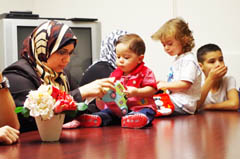

ROCKFORD—Hamed Mustafa Al Hammawi speaks of two groups of people in his home country of Syria: those who are “with the government” and those, like him, who are not.
He talks also about snipers on rooftops, sudden arrests, and consequences for those who gathered earlier in the Syrian war to ask for their rights and for freedom — arrest and sometimes death.
On Sept. 22, Hamed and his wife and children came to the Catholic Charities Refugee Resettlement Office for an “English as a Second Language” class and to chat through an interpreter with a reporter from a local TV station and The Observer.
Also present were members of a second Syrian family that has been in Rockford for about a month – Ahmad Yousef, his wife, Huba, and toddler son, Ibrahim. Ahmad and Huba are not yet working, but their older children are attending school. The working parents in the other two Syrian families that have come to Rockford were at their factory and hospitality jobs this morning.
The ESL classroom was filled with one teacher and four rows of refugees from a variety of countries, all repeating phrases such as, “My name is Ann, and I am from China.” Some spoke with gusto while others were much more hesitant, but all were quick to smile at me when I slid into the room trying not to be disruptive.
Janet Biljeskovic, program director, says that in the last six months they have welcomed refugees from Congo, Iraq, Burma, Iran, Ethiopia, Eretria, and four families from Syria. The Syrians all fled their homeland a few years ago. They lived in Jordan as they awaited resettlement.
The Al Hammawi family’s trek to Jordan began in 2011 when Hamed obtained passports for his wife and children (he already had one). They escaped from state to state, he says, with the help of their relatives, reaching the country of Jordan in two days. Relatives in Jordan prepared a small apartment for the family. They arrived in Rockford this Sept. 15, wearily exiting the bus from O’Hare airport.
Tired, yes. But they finally felt safe.
“They used to be so scared,” Hamed says of his children. His older sons, ages 16, 12, 9, and oldest daughter, 14, had become afraid to go to school or play outside, he says. They were nervous even when they were at home whenever they heard noise outside.
His oldest son, Nedal, explains that they were afraid that people would come and arrest them, and they would be killed. Becoming more animated, he says that his school was located behind a mosque whose patrons were very traditional and who sided with the government. One day, people there started shooting guns, and the teachers told the students to go under their desks.
He escaped arrest that day, Nedal says, because he did not go outside like other kids did. (My understanding from the translation is that many of his classmates were of that pro-government group and could leave safely.) Nedal helped his neighbor get his children from inside the school but he himself did not go outside because, he says, he is a Sunni and would have been arrested.
Asked how they felt when they heard they were coming to the U.S., Hamed says the feeling was that they were being saved. He adds that he felt comfortable leaving his homeland to find more opportunities for the future.
When asked for a comment, Hamad’s wife, Amal, expressed some sorrow, saying she knows she will miss her homeland, particularly her friends, relatives and the Syrian culture.
Ahmad Yousef says they like Rockford, that it is a nice city and quiet. They, too, hope for safety and for “more future” for their children.
With a small smile, he adds that “Syria is more expensive.”
When asked “What do you want people to know about you?” Hamed says, I want people to know that Syrian people are affected a lot by the government.
Most people in Syria want to work, he says, adding that their goal is “to create a good home and family.”














